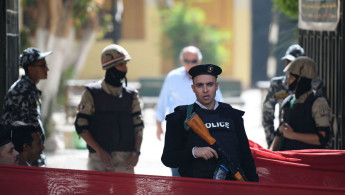Egypt buries ousted president Morsi in closed, dawn ceremony amid tight security
Egyptian authorities have buried the country's first democratically-elected president under heavy security in a dawn ceremony closed to the public and press.
Mohamed Morsi was buried in a cemetery dedicated to prominent Islamists in Cairo a day after his dramatic collapse and death inside a Cairo courtroom, Morsi's lawyer Abdel Moneim Abdel Maqsoud said.
The lawyer mentioned that a few members of Morsi's family were allowed to attend funeral prayers in the mosque of Cairo's infamous Tora prison, followed by the burial at the government's cemetery that contains the graves of other leading Islamists in the city's Nasr City district.
Morsi's son, Ahmed, said authorities refused to allow Morsi to be buried at the family's cemetery in his hometown in Sharqia province in the Nile Delta.
The ousted president was buried next to former Muslim Brotherhood head Mohamed Akef, who died in prison in 2017, and another prominent Islamist leader.
Security agents turned reporters away from the cemetery and prevented them from taking photographs of the funeral. Reporters were also barred from travelling to Morsi's hometown.
Rights groups have called for an independent probe into the detention conditions and death of Morsi.
Morsi, 67, and was elected president in 2012 in the country's first free elections following the ousting the year before of longtime autocratic leader Hosni Mubarak.
The military toppled him in 2013 after protests and crushed the Brotherhood in a major crackdown, arresting Morsi and many others of the group's leaders.
During his years in prison, Morsi, who was known to have diabetes, was held mainly in solitary confinement, denied healthcare and was largely barred from receiving visitors.
His family was only allowed to visit three times.
Since the military coup, Morsi and other Brotherhood leaders have been put on multiple and lengthy trials.
Morsi was sentenced to 20 years in prison on charges of ordering Brotherhood members to break up a protest against him, resulting in deaths.
A death sentence against him was overturned and commuted to life imprisonment while multiple cases were still pending. Monday's session was part of a retrial on charges of espionage with the Palestinian Hamas militant group.





 Follow the Middle East's top stories in English at The New Arab on Google News
Follow the Middle East's top stories in English at The New Arab on Google News
![Netanyahu furiously denounced the ICC [Getty]](/sites/default/files/styles/image_330x185/public/2024-11/GettyImages-2169352575.jpg?h=199d8c1f&itok=-vRiruf5)
![Both Hamas and the Palestinian Authority welcomed the ICC arrest warrants [Getty]](/sites/default/files/styles/image_330x185/public/2024-11/GettyImages-2178351173.jpg?h=199d8c1f&itok=TV858iVg)
